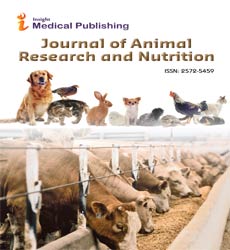Impact on aquaculture sector due to COVID-19
Shivangi Khare
DOI10.36648/2572-5459.21.6.71
Shivangi Khare
School of Applied Sciences, Pune University, India
Corresponding author Shivangi Khare
School of Applied Sciences
Pune University, India
Tel: +91721586999
Email: shivangigkv@gmail.com
Received: December 26, 2020; Accepted: Januay 11, 2021; Published: January 18 , 2021
Citation: Shivangi Khare (2021) Impact on aquaculture sector due to COVID-19.- Shivangi Khare - School of Applied Sciences, Pune University, India. J Anim Res Nutr Vol.6 No.1:71
Abstract
As estimated in 2019, the Malaysian aquaculture sector consists of 391,000 tonnes of cultivated organisms produced per year with an economic value of over USD 700 million. A wide global human pandemic was triggered by the COVID-19 pandemic and is currently ongoing, deeply affecting Malaysian aquaculture, which is critical for the provision of seafood and safety assurance. Nearly 90% of respondents were unanimous in responding, and COVID-19 had a significant impact on aquaculture-related activities in Malaysia; 80% of them described market demand and logistic bottlenecks (72%) as major constraints on their aquaculture activities. Although the use of the online market or digital channels (76%) was the main choice to resolve aquaculture issues related to COVID-19, a significant fraction of respondents requested unique assistance to support aquaculture activities (e.g. financial support). Most respondents (93 percent) were aware of the need for the Standard Operating Procedure (SOP) provided during the MCO/CMCO by the relevant agencies. Present data is critical for the implementation of national and international policy initiatives to support the pandemic seafood market.
Introduction
The Malaysian fisheries business, including aquaculture, catch and inland fisheries, provided 1.85 mt of production with an approximate value of USD 3.3 billion (RM 14.5 billion; Department of Fisheries, Malaysia (DOF), 2020). A recent study provided by the Malaysian Department of Fisheries (DOF, Malaysia) has shown that the Malaysian Gross Domestic Product (GDP) for Agriculture is currently around 12.5 % with the trade value estimated at USD 1.75 billion (RM 7.5 billion). Agriculture sectors contribute about 92 percent of Malaysia's self-sufficient level and include over 18,000 farmers in Malaysia. Among them, with an approximate value of about USD 724, the Malaysian aquaculture sector produces 391,000mt (RM 3.1 billion). As of 2 June 2020, the latest coronavirus SARS-CoV-2, now officially known as COVID-19, has infected more than 6 million people worldwide and has also caused significant social and economic consequences. COVID-19 has spread across China and more than 214 other countries and territories worldwide since the initial outbreak in December 2019, with just three countries declaring zero cases (as recorded at end of May 2020).
The pandemic has prompted multiple countries to take global steps to contain the virus, such as the Movement Control Order (MCO), travel bans and several company closures. Beginning on 18 March 2020, the Malaysian government announced the introduction of the MCO to prevent the spread of COVID-19. Since then, five MCO phases have been introduced and are set to finish on June 9, 2020 as mentioned at the early June 2020). As some call it, the 'new norm' and 'new standard' have influenced agricultural activities in many Asian nations. In order to improve the healthcare system and environmental protection, rapid dissemination and further evaluation of the impact of COVID-19 on aquaculture is required in those areas that rely heavily on aquaculture, local communities such as Malaysia and countries in South East Asia are supported. In order to improve the healthcare system and environmental protection, rapid dissemination and further evaluation of the impact of COVID-19 on aquaculture is required.
particularly, in those areas that depend heavily on aquaculture, local communities such as Malaysia and countries in South East Asia are sponsored. Here, through a study by the Higher Institution Centre of Excellence (HI Coe), Institute of Tropical Aquaculture and Fisheries, University Malaysia Terengganu, Malaysia, we used such a remote (online)-based method to increase our knowledge of the COVID-19 effects on aquaculture sectors in Malaysia. Some questions developed for this study were answered directly or indirectly to farmers and aquaculture entrepreneurs involved during and after the implementation of the MCO. The main objective of this study was to determine the impact on aquaculture-related activities of the COVID-19 situation and to propose an appropriate approach to policy formulation in Malaysia related to that sector.
Discussion
In response to the increasing number of publications related to the COVID-19 study, this study seeks to identify the potential impact of COVID-19 on aquaculture activities in Malaysia. In addition to other recently published studies, arguing about the possible COVID-19 coping strategies in Malaysia [5] the current data set is the first experimental research to investigate the effect of COVID-19 on the aquaculture industry in Malaysia. Our findings showed that most respondents (around 90 percent) expected a negative impact on their aquaculture business and activities, and this appeared to be consistent with what other recent surveys in other countries have shown. For example, over 90% of respondents in the USA have found that their farms or businesses were affected by the COVID-19 pandemic
Conclusions
The significant aspect of this study was that Malaysian farmers are worried about the future as they see great prospects for risks that need to be handled in the coming months. From a decision-making point of view, such an outcome is relevant, and it may be a first step in informing the policy-making process, although our study may have some limitations.

Open Access Journals
- Aquaculture & Veterinary Science
- Chemistry & Chemical Sciences
- Clinical Sciences
- Engineering
- General Science
- Genetics & Molecular Biology
- Health Care & Nursing
- Immunology & Microbiology
- Materials Science
- Mathematics & Physics
- Medical Sciences
- Neurology & Psychiatry
- Oncology & Cancer Science
- Pharmaceutical Sciences
